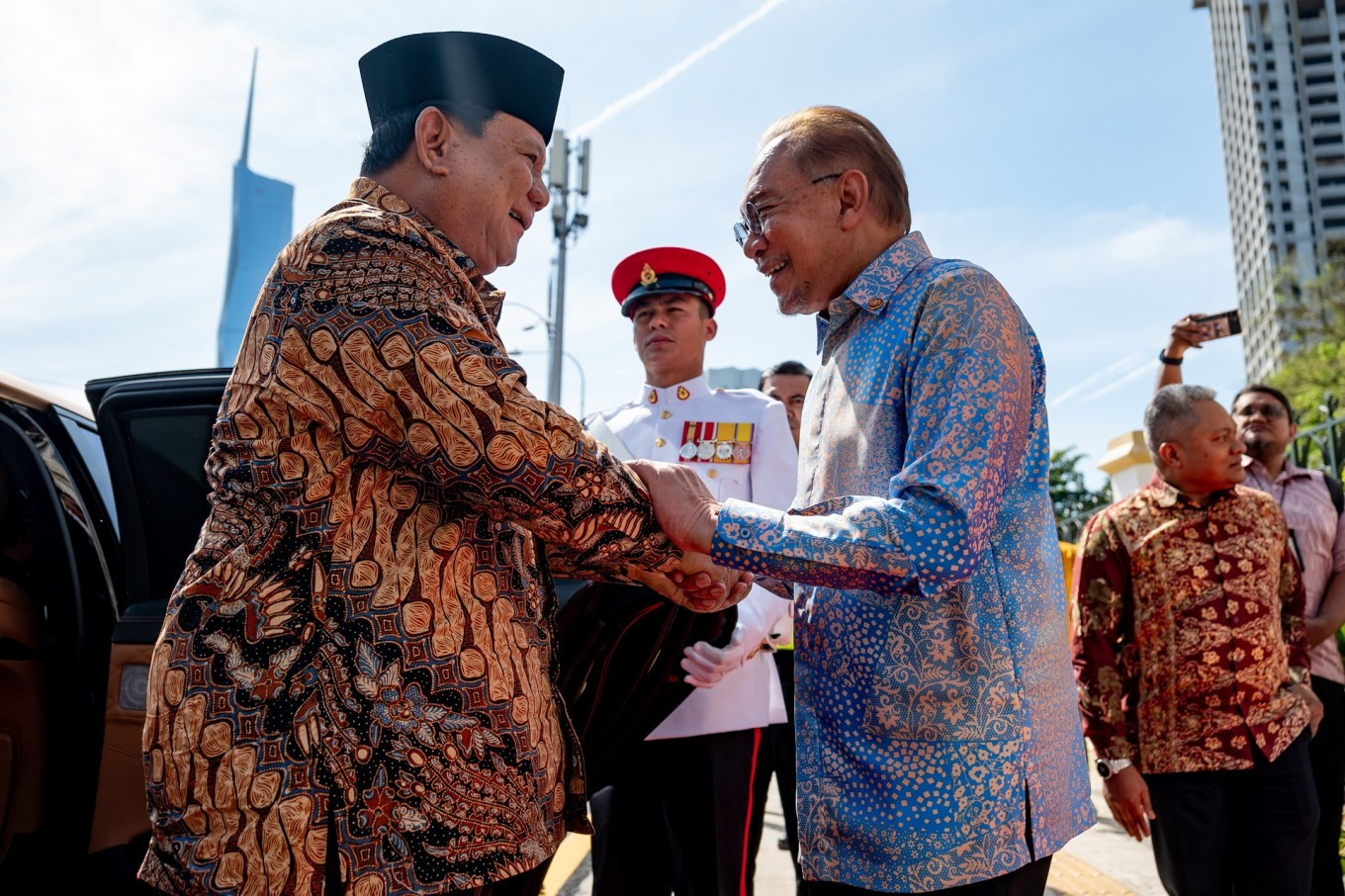News
Joint development only win-win option for Ambalat
Tenggara Strategics August 20, 2025 Malaysian Prime Minister Anwar Ibrahim (right) greets President Prabowo Subianto (left) upon the latter's arrival at Rumah Tangsi tourism and cultural center in Kuala Lumpur, Malaysia on Jan. 9, 2025. Prabowo visited Anwar in Kuala Lumpur to discuss various bilateral and regional issues. (Handout/Prime Minister's Office of Malaysia/Afiq Hambali)
Malaysian Prime Minister Anwar Ibrahim (right) greets President Prabowo Subianto (left) upon the latter's arrival at Rumah Tangsi tourism and cultural center in Kuala Lumpur, Malaysia on Jan. 9, 2025. Prabowo visited Anwar in Kuala Lumpur to discuss various bilateral and regional issues. (Handout/Prime Minister's Office of Malaysia/Afiq Hambali)
Jakarta is right in pushing Kuala Lumpur to join hands in developing the disputed, mineral-rich maritime area located east of Borneo in the Sulawesi Sea. Though the latter does not appear to be all that keen about the idea, it has not completely rejected it.
Officially, the two countries still place their faith in diplomacy to resolve the dispute over the maritime boundaries in the area, which Indonesia calls the Ambalat Sea, a subset of the Sulawesi Sea, and Malaysia insists on calling it part of the Sulawesi Sea.
Although negotiations over the maritime demarcation have been going on for decades now, the idea of joint development is slowly gaining traction as an intermediate solution. For historical reasons, neither is interested in international arbitration, and no one is contemplating the only other option to settle the territorial dispute: war.
President Prabowo Subianto and Prime Minister Anwar Ibrahim discussed the long-standing border issue on July 29 during the Indonesia-Malaysia annual consultation in Jakarta. Although their joint statement following the meeting made no mention of developing the maritime area together, both leaders addressed the issue at the subsequent media briefing.
An Indonesian official said the matter was deliberately omitted from the statement because the idea was still in an early stage, and the two governments had yet to agree on certain technical aspects. But government sources also said domestic politics on both sides had affected their decision to not commit anything to writing for now.
Although the dispute goes back to the 1970s, it came to a head in the 2000s when Indonesia gave concessions to Italian energy company ENI and the United States’ Unocal for oil and gas exploration in the Ambalat Sea. Meanwhile, Malaysia gave an overlapping concession to the Anglo-Dutch oil company Shell. It is not clear how far along the three companies are in their explorations, but the issue’s resurfacing has certainly put the brakes on their activities and with it, tensions between the two neighbors.
In their joint statement, Prabowo and Anwar said they discussed the mutual need for diplomacy to finalize the delineation of their shared terrestrial border on Borneo, between North Kalimantan and Sabah state, and their wider maritime borders.
The joint General Border Committee is far from resolving the issues surrounding Ambalat, which has become most important, given its huge positive and negative potentials for both countries.
The two leaders confirmed that negotiations to settle the dispute were ongoing, even as they considered a joint development project.
Indonesia and Malaysia have both had a bitter experience with the International Court of Justice (ICJ), so they are unlikely to go back to The Hague for arbitration.
In 2002, Indonesia lost Sipadan and Ligitan when the ICJ ruled in favor of Malaysia, simply on the basis that it was already administering the islets in the northern Sulawesi Sea. In 2008, Malaysia lost Pedra Branca, an islet just off the Singapore Strait, when the ICJ cited almost the same reason to award it to Singapore.
Similarly, they cannot place much hope in ASEAN, since the grouping’s dispute resolution mechanism is not designed to settle territorial claims between members. At best, ASEAN could encourage a neighborly spirit so as to prevent members from resorting to the use of force.
Last month’s brief conflict between Thailand and Cambodia over their common border, however, is a stark reminder of ASEAN’s inability to prevent such disputes from erupting into a full-scale conflict. Southeast Asia might have been largely peaceful and stable over the last few decades, allowing countries to focus on economic development, but the Cambodia-Thailand border skirmish came as a warning that they cannot take peace for granted, especially since all ASEAN countries are still in border talks with their neighbors.
Both Prabowo and Anwar also face domestic pressure from die-hard nationalists in Indonesia and Malaysia, including their militaries, not to give an inch of sovereign territory in these negotiations. The like-minded grassroots in both countries never tire of reminding their leaders not to lose again this time, citing the outcomes of the Sipadan-Ligitan and Pedra Branca cases.
The two countries also share the history of war in the 1960s, dubbed “Konfrontasi” (confrontation). Not long after, ASEAN was founded in 1967 on the pledge that member countries should emphasize cooperation rather than confrontation.
The pressure has never been stronger for Indonesia and Malaysia to jointly develop the disputed maritime area on the promise of a win-win economic solution.
What we've heard
During their meeting at Merdeka Palace, President Prabowo and Prime Minister Anwar agreed to resolve legal matters related to the Ambalat maritime boundary dispute as soon as possible.

